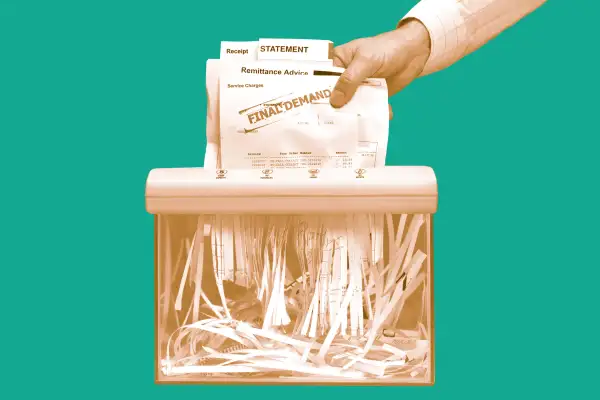If You're Not Shredding All Your Mail, You're Making a Big Mistake

There's a head-spinning number of online scams designed to trick people into giving away their personal information. So even if you were taught to always shred your mail before throwing it away, you may have gotten a bit lax in recent years. After all, if the internet is where all the scamming takes place nowadays, right?
Not exactly, security experts say.
"There’s every reason to shred your mail, and no good reason not to" says Julie Ryan Evans, a Consumer Editor for SecurityNerd.com.
We’ve become more attuned to cyber-attacks and email phishing, but “physical mail still contains plenty of identifying information that can help thieves steal your identity, commit tax fraud and other crimes,” she says. “It happens everywhere—in cities, suburbs and rural communities. No matter where you live, you should be aware that it’s a possibility and take precautions to prevent it.”
Here are some things to keep in mind.
Wondering if your email has been compromised in a data breach? Find out with Money’s new data breach tool!
What are the risks of not shredding my mail?
Identify thieves still root through unsuspecting home and apartment dweller’s trash, experts say.
The information they’re looking for “generally includes date of birth, Social Security number, full name, mortgage or rent payments, payment information such as credit card numbers, and passwords and usernames," says Mason Miranda, a credit industry specialist for Credit Card Insider. He warns that thieves can use the information they glean from these documents to open a credit card in your name. This can wreck your credit rating, among other headaches.
What absolutely MUST get shredded?
"Pretty much everything," says SecurityNerd.com’s Evans. "There are the big ones, like bank statements, and tax returns ... but even junk mail may tell criminals more about you than you want them to know.”
Pre-authorized credit cards and "limited time offers" from organizations like AARP often come with barcodes that contain identifying information like your address or, in some cases, account numbers, Evans explains. (To get less junk mail, visit the Federal Trade Commission (FTC's) web page on "Stopping Unsolicited Mail, Phone Calls, and Email.")
If it came in an envelope, or anything with an address label, "be sure to shred that too," she says. "And no, just tearing your mail with your hands a few times is not effective,” Evans adds. “Shred your mail and you shred your chances of being a victim of theft."
I have a bunch of documents at my place and I need to declutter. Is there anything I shouldn't shred?
You can shred all credit card and utility bills after you’ve paid them, but the FTC recommends holding onto pay stubs, medical bills and bank statements for a year before destroying them. And always hold onto all your tax records, just to be safe.
Here's another tip from Evans: Always rip up your prescription labels before chucking the bottle into the recycling bin, since they contain information like your name, doctor’s name and prescription number.
“Thieves can potentially use the information to refill your prescriptions for themselves,” she says, “or as part of their efforts to steal your identity.”
If I accidentally get someone else's mail, should I shred that too?
"You should never rip up or shred someone else’s mail, even if you think it’s junk," Evans says. "Just write 'return to sender' or 'not at this address' on it and stick it back in your mailbox."
While we're on the topic of other people's mail, it's important to keep an eye on what gets sent to your kids, Evans says, as thieves can use school forms and other documents to steal their identity.
I haven't been as diligent about shredding as I should have been. What should I do?
You can use a free credit card monitoring service like Experian or a paid identity theft detection services like IdentityForce to make sure no one has taken out a credit card in your name or, even worse, gotten arrested while using your identity.
If you find that something is amiss, contact the police, freeze your credit cards so no one can open a new account in your name, place a fraud alert on your existing credit cards and file a report with the FTC.
What if I think someone has been going through my mail?
While fraud is illegal, the act of going through one’s trash isn’t inherently breaking any laws if you left it by the curb. “But if they’re trespassing on your property—say, going in your backyard to get to it—then they may be subject to trespassing laws and you can call the local authorities," Evans says. “To prevent people from doing so, place your trash out as close to the time it’s picked up as possible.”
A great way to make it harder for thieves is to request digital bills and bank statements rather than paper copies, Evans says. Also, consider using outdoor security cameras to keep an eye on your trash cans, or investing in a locked mailbox.
More from Money:
The Hidden Costs of Buying Fake Cosmetics on Sites Like Amazon
How to Stop Spam Calls and Texts for Good
The Best Identity Theft Protection Right Now